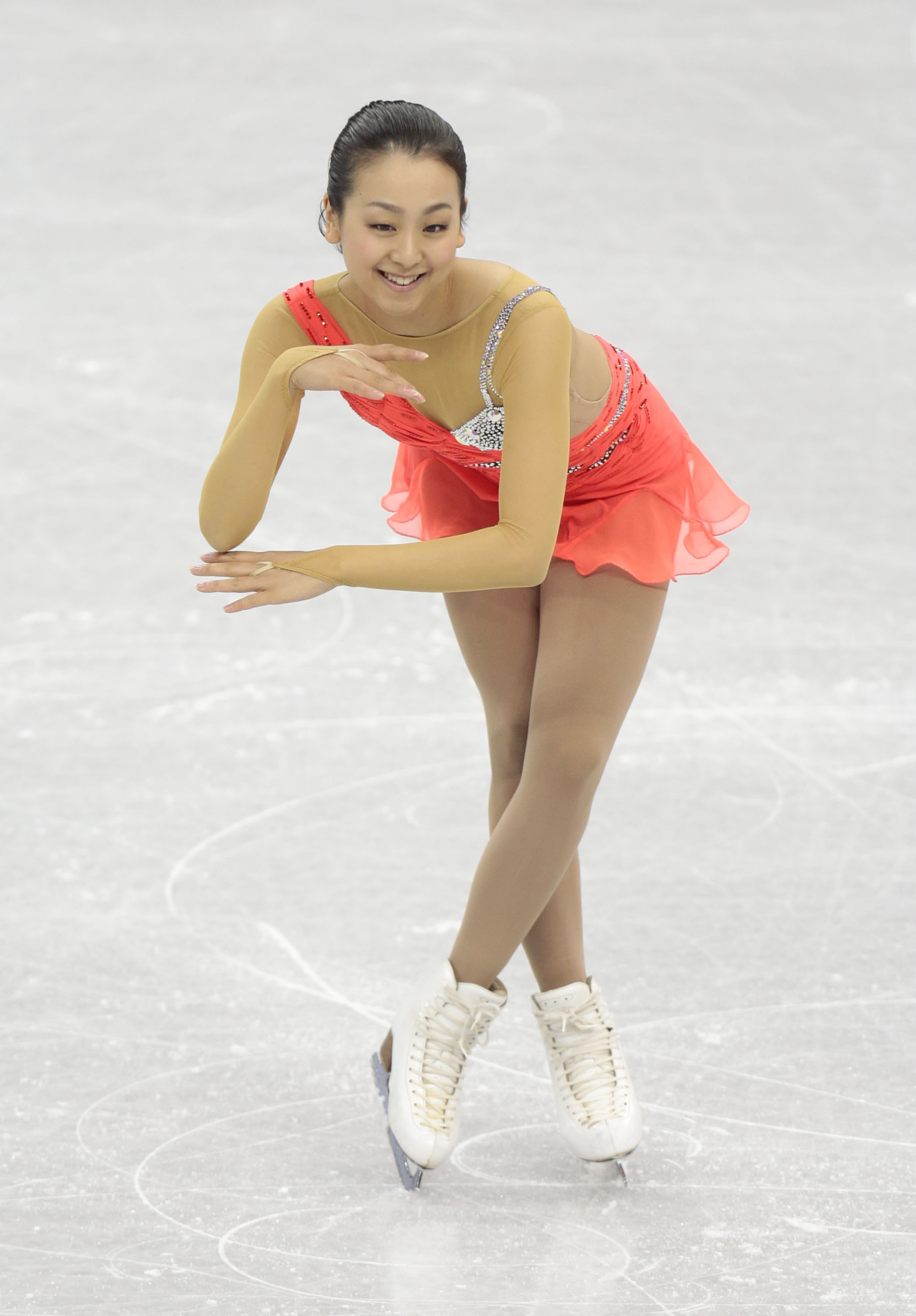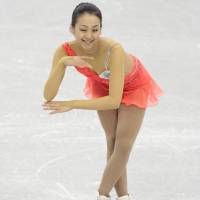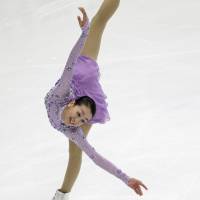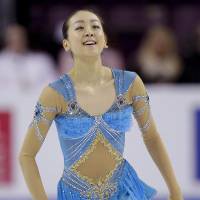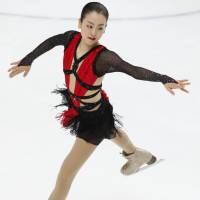The news hit Japan and the skating world like a thunderbolt last Monday night when Mao Asada announced she was retiring from the sport.
A true giant was departing. There was no other way to put it.
The three-time world champion decided it was time to step away from a vocation that had dominated her life since she was 5 years old. Citing a lack of motivation after finishing 12th at the Japan nationals in December, Mao chose not to forge ahead and try to skate in the Olympics for a third time.
In the end it likely came down to arithmetic. Once it was determined that Japan would have just two spots in women's singles for the Pyeongchang Games after the results at the world championships, that reduced Mao's and everybody else's chances at making the team by one-third.
Based on Mao's results the past two seasons, and the talented crop of young skaters she would have been vying with, the odds were clearly not going to be in her favor.
The mental and physical energy the 26-year-old would have needed to expend for another run at trying to make the Olympic team was just too much in the end. As painful as it is for her legion of fans, I think Mao made the right decision.
I remember interviewing tennis legend John McEnroe years ago, and him talking about how in his later years as a player it was the mental stress of having to get up to go out and destroy a lower-ranked opponent that took more of a toll on him than the physical aspects of the game.
I believe Mao was facing the same conundrum.
Mao has left us with so many memories in her brilliant career that it is difficult to narrow them down to just a few. My personal view is that her victory at the 2005 Grand Prix Final, when she won the event while technically still a junior, was the best.
Bursting onto the scene at the prestigious event in Tokyo, the 15-year-old Mao dominated her older competitors to claim the gold in stunning fashion.
Other moments that stand out include the 2008 GP Final in South Korea, where she came from behind after the short program to beat Yuna Kim with two titanic triple axels in the free skate, the 2011 nationals where she won her fifth senior national title just a few weeks after her mother Kyoko's untimely passing, and her first senior world crown in 2008 in Gothenburg, Sweden.
Though her victories were numerous, it was a single element — the triple axel — that she will always be most associated with. Her ability to execute the difficult 3.5-revolution maneuver is what set her apart.
To this day only seven women in the history of skating have cleanly performed the triple axel. There are many men that still find the jump tough to do.
Mao clung to the triple axel likely far longer than she should have, but that is just the way she was. The Nagoya native had a fierce drive that said, "This is what got me here, and I'm sticking with it."
My job as a sportswriter covering skating is to chronicle and analyze the sport, not be a cheerleader. Some of Mao's fans did not understand this and often expressed their dismay when I criticized her.
Just as I can respect the way that Mao did things her own way, I'm sure that she could appreciate that journalists have to do the same. It's business, not personal.
Some may wonder why I left Mao's free skate at the Sochi Olympics off my list. It is simply because I saw it differently than many.
After placing a shocking 16th in the short program, Mao had no chance at winning a medal. Freed from the stress of competition, she was able to cut loose in her free skate as if it was an exhibition. She responded unquestionably with a sublime effort.
But in the greater context of the event, it was irrelevant. It was certainly a very poignant moment and helped Mao finish sixth, but that was it.
Contrast that with what Yuzuru Hanyu did in his free skate at the worlds in Helsinki earlier this month and you may see what I mean. Facing intense pressure after placing fifth in the short program, Hanyu knew it was do or die in the free skate.
Hanyu responded with what many believe was the greatest skate of all time on his way to a second senior world title. It was absolutely phenomenal.
I can say without reservation that I have written more about Mao than any other athlete I have covered in my long career in sports journalism. I'm happy about this because she was such a fascinating figure to profile.
Always kind and respectful, Mao had a gentleness that made you feel warm. Like many, I was taken by her the first time we met.
One of my prized possessions is a two-page letter that Mao's mother wrote to me back in 2006 when Mao was just 15.
Mao's appeal to the masses extended far beyond Japan, resonating on a global scale. Skating boards were flooded with saddened fans last week bemoaning Mao's decision to call it quits. Many of them were quite emotional, which attested to the connection they felt to her.
Her retirement news conference last Wednesday in Tokyo, which featured some 400 media in attendance, was unlike anything Japan has witnessed on the sports scene since the final game that legendary Yomiuri Giants star Shigeo Nagashima played in 1974.
Just like Nagashima, Mao touched something deep within the Japanese psyche. It was the pure love of their sport and their magnetism that made people feel proud. They represented the very best of Japan — attractive, talented, determined and always performing with class.
Because Nagashima played in a time when little was known about Japanese baseball outside the country, he did not develop the global following that Mao has. Television and the internet gave the world a chance to see Mao's incredible combination of athleticism and elegance.
USA Today columnist Christine Brennan, the author of the best-selling book "Inside Edge," relayed her thoughts on Mao in an email to Ice Time.
"Mao was one of the greatest skaters in the history of the sport," Brennan wrote. "She was ground-breaking, innovative, lyrical, beautiful — just a delight to watch and to cover. She was a wonderful athlete and masterful artist, which means she embodied the essence of her sport. It's certainly the end of an era."
Mao missed out on competing in the 2006 Turin Olympics because she was not old enough according to the ISU rules. Based on her results that season, she would have entered as the favorite and had a good chance of going home with the gold.
Shizuka Arakawa ended up as the Olympic champion, but the record shows that Mao beat her three times that same season.
I think Mao would be the first to tell you that she should have won far more than three world titles. Ice Time thinks it should have been more like five or six. She was that gifted.
Michelle Kwan is an icon in the sport with her five world crowns and nine U.S titles, but like Mao she never won the Olympic gold. That does not lessen the reverence that fans have for both of them.
To help put Mao's career and contributions in perspective, Ice Time reached around the world for reaction from several people.
Brian Orser, who coached against Mao for years and led Kim to the gold medal at the 2010 Vancouver Olympics, took time out from a vacation in Bali to send Ice Time an email with his thoughts.
"Women's figure skating is stronger and more beautiful than ever because of Mao Asada's contribution," Orser wrote. "Thank you Mao for all you have done. You will be missed, and I know you will continue to find greatness."
Ice Network's Lynn Rutherford, one of the premier skating writers today, sent Ice Time a detailed reply on her feelings about Mao.
"All the years I watched Mao, two things stand out the most: her grace and femininity on the ice, and her strength. She never took the easy route," Rutherford wrote.
"Her triple axel was a signature, and she knew people wanted to see it, so she always tried it in pressure situations on the big stage, regardless of whether it was working in practices. She was also courageous artistically: for the 2010 Olympic season, she tried a new style under Tatiana Tarasova. Frankly, I didn't think the programs best fit her strengths — "Bells of Moscow" was ponderous and heavy — but she skated beautifully."
Rutherford cited Mao's grit as one of her enduring characteristics.
"She never got discouraged by a loss, she always came back to win again, and that's the mark of a true competitor," Rutherford wrote. "My favorite memory of Mao will always be her free skate in Sochi, and the beautiful, passionate step sequence she did to Rachmaninoff. She skated in the second group of the night and delivered one of her best performances, when there was no chance for a medal. And then a few weeks later she was back, winning her third world title. I don't think anyone ever loved the sport more than she did.
"Even her final season, when things weren't going her way, she had the courage to compete," Rutherford added. "She easily could have retired a years earlier, but she still wanted to test herself. She is a real fighter."
Moa Iwano, one of Japan's rising skating stars, is just one of countless youngsters who were inspired by Mao.
"It is very sad she will be absent from the skating world because she was an athlete everyone admired," the 13-year-old told Ice Time.
"I've been so happy since I've been trying to be a 'Mao-chan' for a long time, so I thought I would do my best to be such a skater."
Iwano echoed the universal sentiments of all those in the skating community.
"Mao-chan is not in the skating field in the future, but I hope that Mao will be happy forever," Iwano wrote.
Tomoki Hiwatashi, a champion at four different levels in the U.S., said if it wasn't for Mao he might not be skating at all.
"Mao Asada is the reason I started and got into figure skating and I feel like she is a goal for me and many other skaters," Hiwatashi wrote in an email. "I think everyone dreamed to be like Mao Asada especially people at my age because we all grew up watching her while we learned how to walk on ice, do singles, doubles, triples, and quad jumps."
Hiwatashi, who was born to Japanese parents in the U.S., hopes to be able to skate along side his idol at some point in the future.
"I still can't believe how Mao is quitting," the 17-year-old wrote. "I still feel like there is a big hole in my heart. But, I really want the best of luck for her and if I have a chance, I would love to skate with her one day at ice shows or at other occasions."
Multiple requests for comment from Kim on her longtime rival’s retirement were not responded to by press time.
All Japanese skaters competing today owe a debt of gratitude to Mao. She was the one who lit the rocket under the sport and made it take off here. That is irrefutable.
Though Mao's departure from competition is sad, the good news is that her adoring fans will still be able to see her in shows for years to come. We will see her get married someday, have children, and maybe even become a coach. We should all be thankful for that.
Japan has truly been blessed to have this young lady as an ambassador for so long. I have often wondered if Mao was really born or sent down from heaven with wings on her back.
I like to think ahead, and for the past couple of years as it became clear that Mao might be nearing the end, I envisioned what I thought would be a fitting way to pay tribute for all she has done for skating.
First off, I think a life-size statue of Mao should be built outside her home rink at Chukyo University. She surely deserves it.
Ice Time would also like to see an event organized here in Japan with many great Japanese and foreign skaters from the past and present taking part to honor her. Something like "An Evening for Mao" to be held at a large venue.
As part of the price of admission, all the fans entering the arena would be given a single red rose. Mao would skate last, and when she finished the fans would express their appreciation for her by showering the ice with the flowers.
Mao taking a final bow, encircled by thousands of red roses, and the adulation and love of her fans.
That is the way it should be.
A selection of Jack Gallagher's writing about Mao Asada through the years:
Has Mao come to end of line with triple axel?
www.japantimes.co.jp/sports/2016/10/11/figure-skating/mao-come-end-line-triple-axel/
Mao mystery finally solved eight years later
www.japantimes.co.jp/sports/2016/05/10/figure-skating/mao-mystery-finally-solved-eight-years-later/
Mao's return great news for Japan, skating
www.japantimes.co.jp/sports/2015/05/26/figure-skating/maos-return-great-news-japan-skating/
Mao's inflexibility hurt medal chances
Will Kim's return provide new motivation for Mao?
Mao was blessed with a mother who gave it her all
Mao's magnetism resonates on a global scale
www.japantimes.co.jp/sports/2010/04/28/figure-skating/maos-magnetism-resonates-on-a-global-scale/
What now for Mao?
www.japantimes.co.jp/sports/2010/03/10/figure-skating/what-now-for-mao/
Mao, JSF appear content to retain present course
Time for Mao to consider Morozov
www.japantimes.co.jp/sports/2009/04/05/figure-skating/time-for-mao-to-consider-morozov/
Mao's poise under pressure proved decisive in 2008



